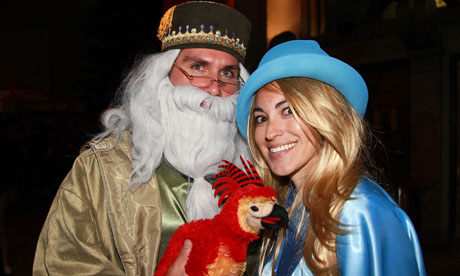
Should JK Rowling awake this week to find a gaggle of middle-aged, particularly well-groomed fans encamped outside her Edinburgh home there could be a simple explanation: a posse of Warner Bros film executives have arrived from LA to beg, one final time, for another Harry Potter novel.
In an industry where there is traditionally no such thing as a surefire hit, the films of Rowling's books have, for a decade, proved the exception.
The eighth and final movie, Harry Potter and the Deathly Hallows Part II, looks set to outdo even its predecessors, taking not far short of $500m (£310m) worldwide in its first few days, and beating the US and UK records for an opening weekend.
The last chapter in the now-adolescent wizard's struggle against the forces of evil took £23m in the UK from Friday to Sunday, easily eclipsing the previous record of £18.3m, set by Deathly Hallows Part I, the initial instalment of the two-film final Potter novel. In North America it gathered almost $169m – $10m more than the previous record, 2008's Batman film The Dark Knight.
It looks set to beat the £66m UK gross taken by the first title, Harry Potter and the Philosopher's Stone, said box office analyst Charles Gant: "Some viewers started off with the series and then dropped away, while younger children caught up with the early films on DVD. Those two audiences are now coming together for this final chapter. That's why it was always likely that this film would be even bigger than the others."
In addition, this is the first Potter film available in 3D, for which cinemagoers usually pay a premium. Almost half the global audience so far have gone for this option, helping to bring in $475m in total, amid an expectation that this will be the first Potter film to break $1bn.
The franchise has charted the characters' – and the actors' – passage from prepubescence to adulthood.
But it is still likely to be hard statistics that cement its place in cinema posterity. According to one estimate, the films have earned Warner Bros close to $21bn overall, including merchandise.
In the UK alone they have brought in almost £400m in cinema receipts since 2001, according to Sean Perkins, head of research and statistics at the British Film Institute. The BFI's list of the 20 top-grossing UK films includes six of the seven previous titles, with only the third outing, Harry Potter and the Prisoner of Azkaban – paradoxically often named by critics as the best – just missing out. But even this made £46m.
Warner now faces a gaping hole in its summer release schedule. Gant said: "For the last decade this has been the absolute anchor for them. The grosses of the Harry Potter films have just been so consistent.
"There's the famous dictum in Hollywood: 'No one knows anything.' You never know what's going to work and what isn't going to work. But the closest thing there's ever been to a sure thing has been Harry Potter, certainly after the success of the first film. In the world of film-making, things you can count on are very, very rare."
If all this wasn't sufficiently cheering news for Rowling, Monday saw the final demise of a long-running – if seemingly speculative – lawsuit claiming she lifted the plot of one book from another author.
The appeal court in London struck out a claim made by the trustees of the estate of Adrian Jacobs, who died in 1997, after they failed to pay the first instalment of £1.5m needed as security for costs.
Rowling was accused of taking the plot of the fourth book, Harry Potter and the Goblet of Fire, from Jacobs's Willy the Wizard, and faced a demand for more than £600m in damages.
A parallel US claim was previously rejected out of hand by a judge, who noted that Rowling's book stretched to 734 pages while Willy the Wizard was just 16.

